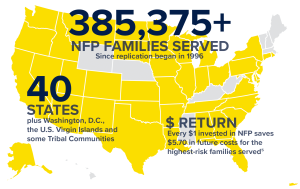Unsurpassed evidence of effectiveness.
Nurse-Family Partnership is validated by research, yet continuously improved.
Over more than four decades, Nurse-Family Partnership has been developed, tested and replicated in community settings. This work has been founded on four principles:
- Develop the program well before testing it.
- Test it thoroughly before offering it for public investment.
- Replicate it carefully. Continue rigorous evaluation of national replication.
- Improve it continuously.
This approach has contributed to the NFP program being identified as the only early childhood program that meets the Coalition for Evidence-Based Policy’s “Top Tier” of evidence1, as the program with the strongest evidence that it prevents child abuse and neglect2 and as a program that produces significant economic return on investment.3-4
Program founder Dr. David Olds, his research team, and the Nurse-Family Partnership National Service Office staff believe they have a responsibility to the families in the program — a responsibility to know whether Nurse-Family Partnership actually improves maternal life course and child health and development. It is also a responsibility to society to know if taxpayers’ dollars produce returns on investment. The evidence is clear: Nurse-Family Partnership delivers on both grounds.

Learn More
Overview of Nurse-Family Partnership
Benefits and Costs
1. “Social Programs That Work.” Coalition for Evidence-Based Policy.
2. MacMillan H, Wathen L, Barlow NC, Fergusson J, Leventhal DM, Taussig JM, Heather N. Interventions to prevent child maltreatment and associated impairment. Lancet 2008; 1-17.
3. Aos S, Lieb R, Mayfield J, Miller M, Pennucci A. Benefits and costs of prevention and early intervention programs for youth. Washington State Institute for Public Policy 2004; 1-20.
4. Karoly LA, Kilburn MR, Cannon JS. Early childhood interventions: Proven results, future promise. RAND Corporation 2005.

